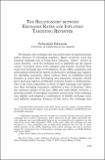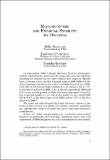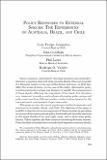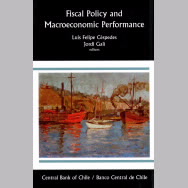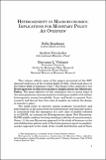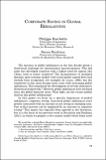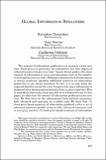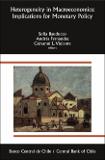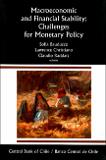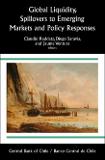Search
Now showing items 1-10 of 40
The relationship between exchange rates and inflation targeting revisited
For decades, the exchange rate was at the center of macroeconomic policy debates in emerging markets. Many countries used the nominal exchange rate to bring down inflation, –others—mostly in Latin America—used the exchange rate to implicitly tax the export sector. Currency crises were common and usually ...
Macroeconomic and financial stability: an overview
On September 2008 Lehman Brothers filed for bankruptcy and the world became aware that the financial crisis that had been unfolding for months was far more serious than expected. Months later it became clear that the financial crisis of 2008-2009 was the worst economic downturn since the Great Depression ...
Policy responses to external shocks: the experiences of Australia, Brazil, and Chile
Open economies, particularly emerging markets and commodityintensive economies, deal with large external shocks. These are typically of a financial nature in the case of the former and real—in that they affect the terms of trade—in the case of the latter. Alternative policy reactions and policy setups ...
Fiscal policy and macroeconomic performance
The fiscal developments around the global financial crisis of 2007-2009 and its aftermath are undoubtedly a major factor behind that comeback. The large fiscal stimulus packages adopted by many countries in the face of large adverse shocks have triggered an unusually heated debate among academics, ...
Heterogeneity in macroeconomics: implications for monetary policy an overview
This volume collects some of the papers presented at the XXV Annual Conference of the Central Bank of Chile, which took place in
November 2022 in Santiago, Chile.1 The theme of the conference was Heterogeneity in Macroeconomics: Implications for Monetary
Policy. The main objective of this conference ...
Corporate saving in global rebalancing
The increase in global imbalances in the last decade posed a theoretical challenge for international macroeconomics. Why did some less developed countries with a higher need for capital like China lend to richer countries? The inconsistency of standard dynamic open-economy models with actual global ...
Global information spillovers
The amount of information produced in an economy varies over time. Stock prices in particular are informative but their degree of informativeness changes over time. Agents do not produce the same amount of information in every macroeconomic state of the world or in anticipation of every state. Although ...
Heterogeneity in macroeconomics: implications for monetary policy
There is important heterogeneity among households, firms, and banks; and the way shocks or policies affect these agents depends critically on that heterogeneity. There was a rapid surge in the awareness of academic researchers and policymakers of the nexus between heterogeneity and monetary policy, ...
Macroeconomic and financial stability: challenges for monetary policy
On September 2008, Lehman Brothers filed for bankruptcy and the world became aware that the financial crisis that had been unfolding for months was far more serious than expected. Months later, it became clear that the financial crisis of 2008-2009 was the worst economic downturn since the Great ...
Global liquidity, spillovers to emerging markets and policy responses
The Book Series on "Central Banking, Analysis, and Economic Policies" of the Central Bank of Chile publishes new research on central banking and economics in general, with special emphasis on issues and fields that are relevant to economic policies in developing economies. The volumes are published ...

